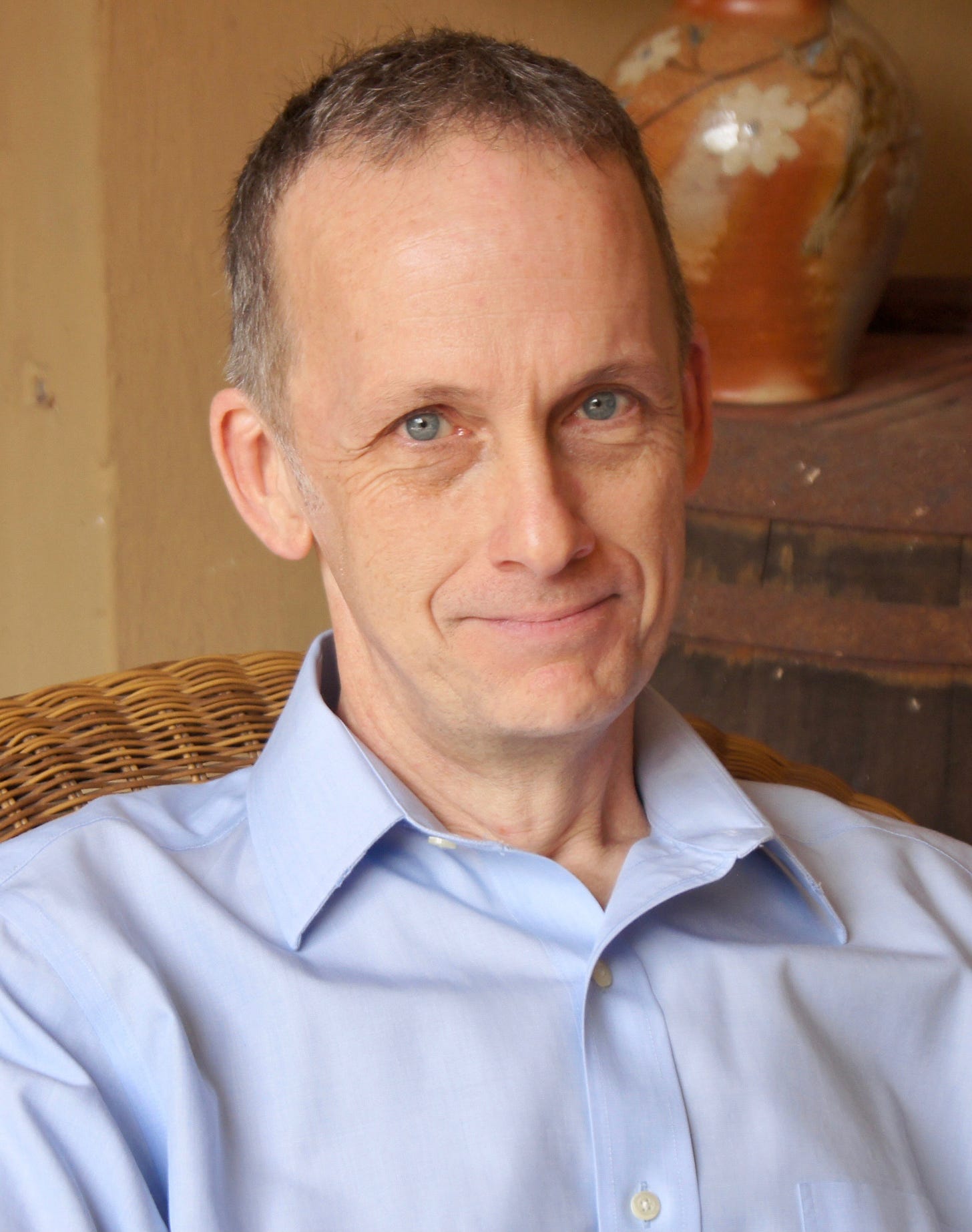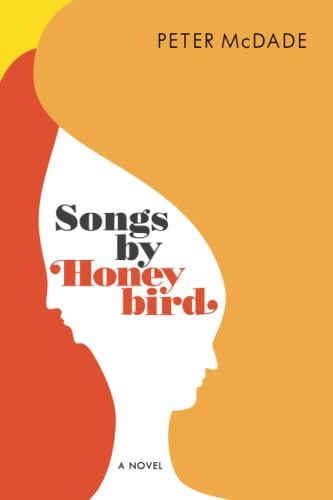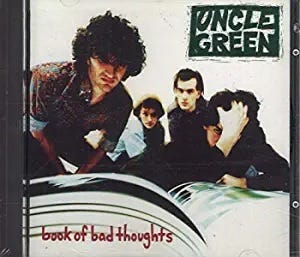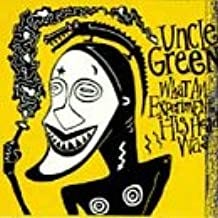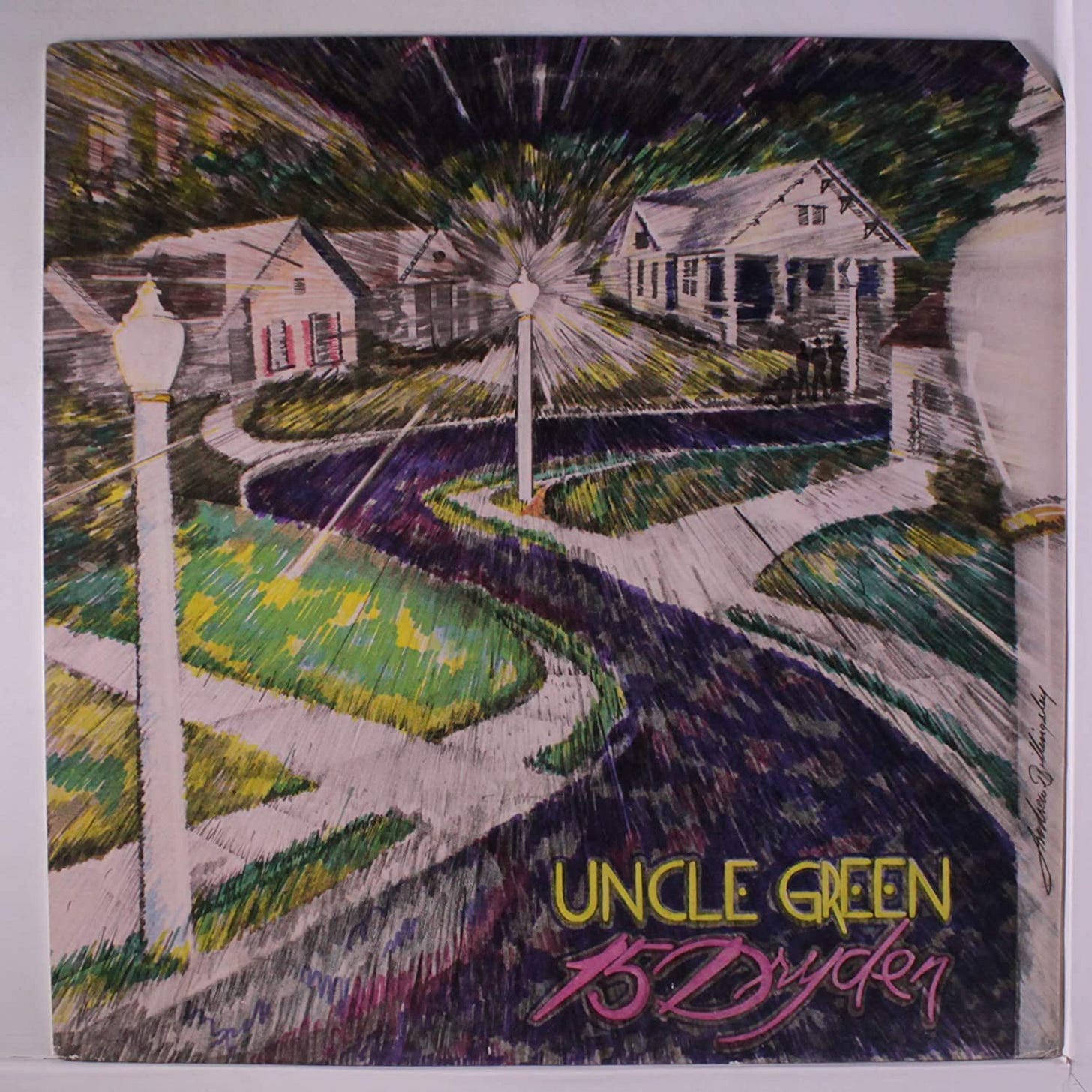Interview with Peter McDade- 2022
Interview #13 (fiction, literary fiction, academic fiction, music album tie-in)
Peter McDade writes novels, teaches history, and plays the drums. After a childhood in New Jersey and years of touring the country with rock band Uncle Green, he has settled happily into domestic life in Atlanta.
Randal Eldon Greene: You've not only written a book that revolves around the history of a fictional rock band, you also had it published by Wampus Multimedia. I want to emphasize the multi here, because when I looked into your publishing house, I discovered a company that both publishes books and releases music albums. I'm curious about what you can tell us about Wampus and how you discovered them?
Peter McDade: The story of how I started working with Wampus is an example of the connection between my novel-writing and my music-making careers. In 2012 the band I have been in since 9th grade, Uncle Green, finally liberated the recordings that had been rejected by Sony Music a decade earlier. A fellow musician suggested reaching out to Wampus, to see if they would be interested in helping with distribution, and I enjoyed their artist-forward approach. They really focus on helping their artists find an audience, while also allowing the creators of the product retain control over the product.
I got to know Mark Doyon, who runs Wampus, through the release of that album, and we would talk music and writing quite often. After I finished The Weight of Sound, my first novel, he read a draft, and then listened to my complaints about the agent- and publisher-querying process, which I found exhausting. Trying to navigate the publishing world brought back unpleasant memories of my experiences with various record labels over the years, and when Mark said Wampus would love to release the novel and its soundtrack, I was thrilled.
I looked around briefly for an agent when I finished Songs By Honeybird, but after Mark read it he responded with such a thoughtful, detailed, and enthusiastic response that I knew the book had found its home.
Randal Eldon Greene: Honeybird follows two main plotlines, that of Nina and that of Ben, ex-lovers dealing with the consequences and causes of their breakup. Nina is a college student and reluctant dog owner. Ben is a doctoral candidate of history. Nina begins the novel heartbroken, finding herself both frustrated and educated by her dog, Sid. Ben throws himself into his dissertation, which narrows its focus to the history of what appears to be one of the earliest integrated Southern rock bands whose black drummer and white singer and guitarist were killed in a tragic fire. There are questions left unanswered: Was the fire an accident and is it possible that the drummer, whose body wasn't found, is actually still alive?
The premise, I have to say, is very intriguing. What were the origins for the ideas you packed into this novel?
Peter McDade: My books always start with the characters; for me, it's the best way to find the story. Honeybird began as a single scene of a couple planning to move in together, but when the woman tells her boyfriend about her talking dog he calls things off. The couple wasn't even named, and the short piece felt at first like one of those doodles you write and then slide into a drawer somewhere. I kept thinking about that couple, though, and found myself able to relate to both of them. A talking dog? I can see how that could be a deal-breaker. At the same time, aren't couples supposed to be able to tell each other anything? Shouldn't he have been more understanding? Or, maybe we're all supposed to keep certain things hidden, even from those we're closest to?
The next step—turning that scene into a novel, with enough ideas and people and events to make it worth a reader's time—took many years. I completed a whole draft that did not work, and slid it back into a drawer and wrote The Weight of Sound, which became my first published novel. Those two characters were still with me, though, so I started writing it again, without reading the old version. (I still haven't looked at it—maybe someday?) I changed the topic of Ben's dissertation from Hank Honeybird to his son, Harlan, who felt much more interesting, and the story of Nina's family became more complicated, which helped me understand her more. I had a new draft in a year or so, and this time it felt much more alive.
I realize this answer is more about the characters than the ideas, but again, that's how it works with me. I'm not even aware of what themes and ideas are at play in the book until I've finished a second draft, so, maybe two years into it? I mean, I have glimpses of the ideas and themes, but I don't want to look too closely and scare them away. With each revision the ideas become clearer to me, so I can carve out more paths for the readers to find them, as well. Those initial questions that led me to keep working on that sketch—what can we say to the people we are closest to, and what should we say?—are still there, but new ideas were now attached to that framework.
Randal Eldon Greene: You also released an album to accompany this book. Tell us a little bit about your musical background and how this album came to be.
Peter McDade: I started playing the drums in second grade. The lessons were a birthday present from my mother, who was looking for a way to turn my incessant tapping into something positive. By the 7th grade I was playing in bands, and when I was fourteen I was lucky enough to join Uncle Green, a band I would play with for the next twenty years. Touring, and making records, actually taught me several crucial skills necessary for writing: how to be patient, how to wait out the dull moments, how to accept things you cannot control, and, perhaps most of all, the art of a revision. Most songs undergo many changes from the moment they are first written to the final version the world hears. Over time you learn to try every idea, because even though most won't work, a few magically will—and you never would have found those without trying them all. You also learn that sometimes the way to finish something requires taking away that bit you love.
My first novel, The Weight of Sound, centered on the struggles of a young rock band, and I wanted the reader to be able to listen to the songs my fictional musicians were playing. I was able to convince a bunch of my musician friends to help me record an accompanying soundtrack. I don't write music, but I had fun writing the lyrics, imagining myself to be whichever character wrote the song in the book, and the whole experience was very satisfying—if also exhausting. I was determined to not have a soundtrack with my second novel, but once the band Honeybird began to play such a crucial role, I wanted everyone to be able to hear their songs.
There are only eight songs this time, instead of fourteen, so it was a little easier to finish the album at the same time I was finishing the novel. I recruited Jeff Jensen, who I've known since third grade, and played with in Uncle Green, to serve as the voice of Harlan Honeybird, and my guitar and production whiz friend Jonny Daly produced the record.
I enjoy building as much of a universe for the reader as I can; I have learned that finishing the lyrics, and then hearing the songs, helps me better understand the characters, which makes the book better. "Heavy Heavy Hands," for example, was called "Tired Tired Hands" in earlier drafts, but it didn't sound particular good when I imagined someone singing it. Looking for a way to fix that problem led to the new title, which also works much better thematically.
I've started the new book, and this time I'm not even pretending their won't be a soundtrack (though I have told myself it's OK if the fourth novel doesn't).
Randal Eldon Greene: The character of Ben was sometimes too realistic for me (if that's a thing). The world has changed considerably in the decade since I've graduated. A lot of the political correctness practiced today is of a kind we were only striving toward in my time as a college student. So I appreciate Ben's sensitivity—his "wokeness." But at the same time he came across as almost insufferably woke! And I think you did this on purpose.
It was excruciating in the most enjoyable of ways to watch Ben work through racially charged realities, social etiquette, and his place as a white historian in telling this story. Without his woke attitude, his character wouldn't have worked for the story, but against it. I imagine a very young and conscientious doctoral candidate today would mirror Ben in many ways. Since you are no spring chicken yourself, Peter, I am wondering how difficult it was for you to create a character whose imperfection is arguably his sensitivity to nuance in all situations, which leads him to miss the forest for the trees when it comes to his work as a historian? And as I'm thinking about it, it's even missing the big picture due to his focus on details that is at the heart of him ending his relationship with Nina.
Peter McDade: Excellent question: Ben was not an easy character for me to get right. My books go through many revisions, and it sometimes felt as if the rest of the book was always a step or two ahead of Ben, forcing him to try and catch up. There's an earlier version of this novel that failed for many reasons, but a big one was my inability to fully understand the Ben character. I need time to get a handle on all the characters (did I mention many, many revisions), and with the trickier ones I need to literally walk around with them. So I would put Ben in my head as I walked through my neighborhood, listening to music he would be listening to, trying to think like him. Slowly he came into focus, and understanding him better turned out to be a key step in understanding the novel better.
He does often miss the forest for the trees, but he is also determined to figure out as much of the truth as he can; the focus on details can be a fault, but having the patience to do so may also develop into more of a strength. He just needs to learn how to stand back and view the bigger picture, which I think (hope) is something he will be better at as he gets older. Someone asked me the other day about what happens to him after the novel ends, if I think he finishes his book, and I'm certain he does, in no small part thanks to attention to detail.
I think that you're right, that this part of his personality is what causes him to end his relationship with Nina, and I'm more optimistic about him learning to be better at seeing the forest when it comes to his work than with his relationships.
Randal Eldon Greene: Nina I found to be a much more relatable character, even though my dog hasn't (yet) conversed with me. Ben certainly mirrored my academic life as a professional student. Nina is a nontraditional student, taking her time earning her degree. A professional student I was, but like Nina, certainly not one in any hurry to get handed a diploma.
You seem to have an interest in scholarship itself, as well as ways of learning. What is your relationship with academia? And do you feel your own studies to be akin to either Nina or Ben?
Peter McDade: I spent my twenties touring and making records with a band, so I didn't begin my college life until I was thirty. Once I started going I loved it, though, and I think that is what allows me to appreciate both Nina's approach and Ben's approach. I wasn't in any hurry to get handed a diploma (Hello, Inner Nina), but did find myself having such fun that I tended to overload my schedule, took classes during the summer, and eventually became very focused on finishing before my scholarship ran out (and there's my Inner Ben). In fact, this is the first time I've gotten this question, so as I think about it now, I even split my fields between the two of them—I double-majored in History (Ben) and English (Nina).
I now teach at Clark Atlanta University. It's just part-time, but it does mean I get to walk around campus in a tie, and enter a classroom and try and to engage bored freshmen in World History. The world of academia is one I am now at home in, much the same way I can walk into a smelly rock club and instantly feel like I have been there before.
Another place the academic world and the music world intersect for me has to do with the "ways of learning" part of your question. During a lecture you can look out and see some kids fully engaged, and understanding that last point, while others are blanked out. They could be blanked out because they're tired, or just don't care, but it could also mean I need to try and find a way to rephrase that last point, so I have learned to do that as much as possible. And nothing makes clear how many different ways of learning there are like teaching drums. Some students do best if I set up some musical notation, some just want to watch me, and some do best if they can listen first, without any visual distraction. It's the teacher's job to offer as many ways as possible, so that everyone at least has a chance to try and grasp whatever it is that's being taught.
Randal Eldon Greene: Nina has a nascent interest in Buddhism. Is Buddhist philosophy something of major interest to you or was it simply something explored for the sake of the novel?
Peter McDade: This question also ties back to academia; when I started teaching World History, I had to brush up on ancient religions and philosophies. In fact, as a side note, one of the things I have learned from teaching is that the students could really care less about the dates, and political structures, of ancient societies; the philosophical stuff, and the art and the creative stuff, always hits a much deeper chord.
Buddhism had always interested me, but I didn't know much about it until I did enough research to be able to teach the basics to others. The aspects that appealed most to my students were the same ones that appealed most to me, especially the concept of being present. (Another tangent: maybe not a coincidence that the aspects the teacher found most interesting are the aspects that work best in the class.) I did some more research for the novel, especially around different approaches to meditation. I knew that I wouldn't be able to become an expert in Buddhism, but I wanted to make sure the parts of it the characters did mention more or less rang true.
Randal Eldon Greene: You bring up the idea of the Buddha actually being stuck in samsara still. From my limited understanding, wouldn't that undermine the entire Buddhist religion? The Buddha is only the Buddha after all because he escaped the cycle of rebirth.
Peter McDade: I should begin by making it clear that whenever I answer any questions about the specifics of Buddhist philosophy, it should understood that I am not an expert on the topic—far from it. There are multiple branches of Buddhism, and my own limited understanding shouldn't be taken as authoritative on any of them.
Disclaimers aside, I can say, without getting too close to spoiler territory, that the idea of Buddha still experiencing the cycle of rebirth is mentioned in the novel, but never conclusively established one way or the other. One character also throws out the idea that Enlightenment may not bring escape from Samsara; perhaps for some Enlightenment means the end of Samsara, while for others it means continuing the cycle, so that one can continue to learn and teach. (Again, an idea by a particular character! Not something this author puts forth!)
The term for the final release from Samsara is something I most often see referred to as "Parinirvana," and, as with many of his teachings, the Buddha does not seem to explicitly say what happens after the body ceases to exist—even when the person inside that body has achieved Nirvana. One does not have to die to achieve Nirvana, and what happens after that is not necessarily the same for everyone. Those non-answers were always helpful to me when I thought of Nina, the character in the book for whom these lessons have, I think, the most meaning. I began to see, as I revised the novel, how she learned to move on from regretting what she did not have, and to stop looking for answers she could never find. That's what allows her to more fully understand that she can never know where the fire goes, when it burns out, or where that final note of music goes, and instead to appreciate that what she experiences in the present does not have to be affected by what happens next.
Which is a long way of saying that I did not mean to undermine the Buddhist religion, and certainly hope no one takes offense. The list of things I don't know everything about is long, indeed, and Buddhism is certainly on that list. But even if Buddha were still experiencing Samsara, for whatever reason, I do not think it would undermine the life and teachings he led.
Randal Eldon Greene: Do you have a writing routine? And does your writing process for fiction mirror that of how you writing music and songs?
Peter McDade: It's more like I have writing routines, depending on what stage of the process I am in. The first drafts are the hardest for me, and so I tend to vacillate between sitting down and banging out as many words as I can and continuing on with daily life, waiting for the corner of my brain thinking about the New Book to come up with ideas. I write out of sequence, so whenever a stray scene or fragment comes to me, I write it down, place it in some approximate spot in the overall draft, and get back to folding laundry or working on dinner.
Once I do have a complete draft, I work as much in the mornings as I can, moving through the draft more or less in sequence. This is when I start (hopefully) to figure out just what I've created. By the time I've knocked out a few more drafts, I add as many afternoon hours to my writing time as I can. The closer I get to seeing what the final product is going to be—and how far away I still am from it—the more energy and focus I have to work with the words.
Thinking about the process now, studying it from a bird's-eye view, it's almost as if I spend the same amount of time on an average day working on the book-in-progress, but I gradually decrease the time spent walking around and thinking about it, while increasing the amount of time spent at the MacBook. Which means I would say, yes, I have a routine, and it's a four year routine that I wish was more efficient.
Randal Eldon Greene: As someone who has worked in multiple areas of creativity, what's your advice to those who are just starting out with music or writing? How do you sustain creative drive in the midst of modern life?
Peter McDade: I think the answer to both questions begins the same way: find something that you enjoy doing, and the rest will follow. I've learned over the years that it's just as important to enjoy the process as it is to enjoy the final product. That is, you should strive to enjoy writing/playing music as much as you enjoy the story/piece of music you wind up with at the end. After all, there's no guarantee that anything you create will wind up bringing you fame and/or fortune—the process itself is the only thing you can count on. (Note: I know that there are writers who find parts of the process hard, and manage to keep at it anyway, and my hat is truly off to them. For me, having fun with it is a large part of what keeps me going.)
Which leads nicely to the question about sustaining creative drive. Modern life can be chaotic, and we all know there is literally an endless supply of things to be distracted by. I find, however, that sitting down behind a drum kit, or working in some fictional landscape of my own creation, helps me find the focus to get through the rest of the day.
Randal Eldon Greene: Thank you so much, Peter for taking the time to have this conversation with me about your book. It was a pleasure.
Peter McDade: And the pleasure was mine! I've been enjoying the authors in the series quite a bit, and was thrilled to be part of it.
Purchase Songs by Honeybird: A Novel
Purchase Songs by Honeybird: the album
© 2022
Follow Hello, Author on Instagram @Hello_Author
About the interviewer:
Randal Eldon Greene is the author of Descriptions of Heaven, a novella about a linguist, a lake monster, and the looming shadow of death. His typos are tweeted @AuthorGreene and his website is AuthorGreene.com
You can also support our work by buying cool merch like mugs and t-shirts.

